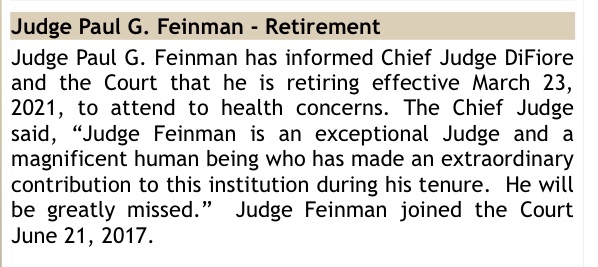In an entirely unexpected announcement this afternoon, Tuesday, March 23, 2021, just before the Court of Appeals was about to take the bench for its first in-person arguments of 2021, Associate Judge Paul Feinman announced that he was retiring from the bench effective immediately, citing health reasons. Obviously, our first thoughts are of his well-being and I certainly wish Judge Feinman the best in his retirement.

Judge Feinman, the first openly gay judge to sit on the Court of Appeals, joined the Court only back in 2017, and had an very accomplished career up to that point. In his four short years on the Court of Appeals, Judge Feinman has certainly had an impact on New York law that I plan to delve more deeply into as we all have more time to process this surprising announcement. I certainly hope Judge Feinman is able to quickly address whatever health issues prompted his retirement, and he is able to focus primarily on what brings him joy.
For the Court of Appeals, Judge Feinman’s unexpected and immediate retirement leaves the Court with only six Judges, and yet another vacancy to fill after Associate Judge Leslie Stein announced last fall that she would be retiring effective June 4, 2021. So what happens now?
First, for the cases currently on the calendar, the Court will sit, as they did today, as a six member bench. The Court has done this in the past in the interim period before a new Judge is nominated, confirmed, and sworn in. For close cases, though, the margin between a win and a loss just became slimmer. Just because the Court is down to six members, the requirement of four votes to issue a decision does not change.
What happens then if a case is conferenced after argument and the split is 3-3? One of two things. The Judges first will try to find a compromise, whether by narrowing the opinion or sheer acts of persuasion, that garners one of the Judges to switch their vote. And if that doesn’t work, then the Court always has the option to set the case for reargument with a judge vouched in from the Appellate Division or, hopefully, with the newly confirmed Judge likely casting the deciding vote.
As the Court goes about its business deciding cases, the Commission on Judicial Nomination heads back to the drawing board, now with two vacancies to fill. Under Judiciary Law § 68, upon an immediate vacancy in the Court, the Commission has 120 days after being notified of the vacancy to come up with a nomination list of up to seven candidates to send to the Governor. Here is the Commission’s vacancy notice:
In this case, the Commission is already deep in that process for filling Judge Stein’s upcoming vacancy. Nothing in the Judiciary Law or the Commission’s regulations that I have found would prevent the Commission from using the same list as they have put together for Judge Stein’s seat to send to the Governor as choices now to fill Judge Feinman’s. The law says it can take the Commission up to 120 days to create the list; it doesn’t say that the Commission can’t do it in only one.
I would guess that the timeline for replacing Judge Feinman on the Court will move very quickly because of how far along the process is already for filling Judge Stein’s seat. Indeed, the vacancy notice specifically notes that people who have already applied for Judge Stein’s upcoming vacancy do not need to resubmit their applications and will be considered for Judge Feinman’s vacancy as well. Notably, the Commission says it will be sending the nomination list for Judge Stein’s replacement to Governor Cuomo “on or about April 9, 2021,” and will “promptly discharge its Constitutional and statutory responsibilities” to pick Judge Feinman’s successor “swiftly” in light of the “extraordinary circumstances presented by Judge Feinman’s unexpected retirement.” And after all of that, the Commission will have to turn to finding a candidate for Judge Fahey’s seat in December when he is forced off the bench by mandatory retirement.
Starting in January 2022, we will have a completely different Court of Appeals deciding New York’s most important legal issues. Get those applications in now if you’re one of the select few who would be interested in serving on our State’s highest court.

4 Replies to “Associate Judge Paul Feinman Announces Immediate Retirement From the Court of Appeals. What Happens Now?”